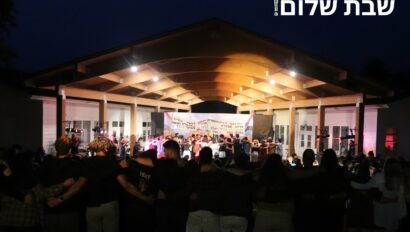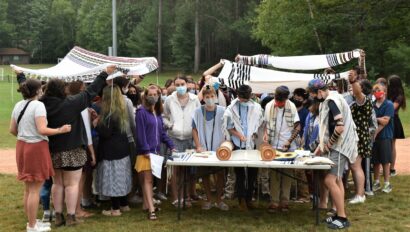We’d like to thank
- Hazzan Joanna Dulkin from Adath Jeshurun Congregation in Minnetonka, MN, and Rabbi Ryan Dulkin from the Minnesota Hillel
- Marc Rissien from Congregation Beth Shalom in Northbrook, IL
- Marc Sender from CHUSY, CRUSY, and Congregation Beth Judea in Buffalo Grove, IL
- Rabbi Todd Zeff from the Nachshon Project
- Briana Holtzman from the Foundation for Jewish Camp
- Ido Ashkenazi from the Jewish Agency for Israel
- Dr. Mitch Kupperman from JCamp180
for joining us for a visit this last week!
On Sunday and Monday we will open up our doors for our annual full-season Visitors Days, complementing the many other families who come to visit throughout the summer or on our Garinim and Halutzim Visitors Days. Whether you’re here with us or at home you should hear of an amazing first machzor (session) and a splendid last week filled with highlight after highlight. I was moved to tears listening to the mother of a Shoafim (8th grade) camper say: “Ramah, you are our village,” in describing the role the camp community plays in her family’s life (Click here to read for more context).
Our Garinim (5th) ended their time at camp with great fanfare during a meaningful last Shabbat and last program day before designing and painting their cabin plaques and some aidah-wide festivities. We greeted Halutzim (6th), Kochavim A (4th), and Taste of Tikvah campers on Tuesday afternoon as they streamed off the buses with shouts of joy.
Yesterday Solelim (7th) and Shoafim engaged in epic softball games including an emotional roller coaster of a final inning as Solelim stormed back from a four run deficit with five runs in the top of the inning only to lose on a walk-off hit with two outs in the bottom of an inning as the sky began to light up as a storm approached. (The kids quickly moved inside after the conclusion of the game per our thunderstorm protocol.)
Bogrim (9th), Machon (10th), and Tikvah spent Monday evening and all day Tuesday in our annual Israel simulation inhabiting each of President Reuven Rivlin’s “Four Tribes” to gain greater perspective on Israel’s domestic and foreign triumphs and challenges. I smiled proudly when one of the campers, asked how the day-long program went, responded: “It was a pretty good day, but sooooo much learning.”
Our Nivonim (11th) girls returned late yesterday afternoon from a three-day canoe trip with huge smiles at what they had achieved and how much fun they had. While the girls were gone, the Nivonim boys spent three days in special programming that combined deep and reflective dialogue, study, and service with Ultimate Basketball, dressing up in togas, and a World Cup Semifinal viewing party.
***
Tuesday evening Solelim premiered a new musical with a one-of-a-kind theatre-in-the-round performance of Seussical: The Musical. Appearances by classic fan favorites the Cat in the Hat, Thing 1, Thing 2, and Yertle the Turtle highlighted a show that focused mostly on telling my favorite of all Dr. Seuss stories: Horton Hears a Who.
The book, told in Seuss’s tell-tale staccato rhymes, shares the story of Horton the elephant, resident of the Jungle of Nool, and the question of whether or not he is losing his mind. Horton hears voices from a speck of dust that no one else can hear, certainly not the mean kangaroo, the evil Wickersham brothers, or the black-bottomed eagle named Vlad Vladikoff. Eventually, the residents of Whoville are able to make themselves heard and Horton is vindicated. The famous message is, “a person’s a person, no matter how small,” translated into Hebrew as: אדם הוא אדם, או גדול או קטן / adam hu adam, o gadol o katan.
I have vivid childhood memories of my dad reading Horton Hears a Who to me as a bedtime book, and my love for its message led me to read it to Nivonim campers as part of our counselor training program when I was a Rosh Aidah (division head). Today, as the father of three children, I love reading it to them, and its educational message remains as relevant as ever.
In this week’s Torah reading we find a parallel message to the moral of Horton’s story, one equally resonant but far more subtle. Near the end of the Book of Numbers, which we conclude tomorrow, we read the travelogue of the Israelites’ journey through the wilderness. For the better part of thirty-eight years, from the conclusion of the events in last week’s parashah, Pinchas, until next week’s reading from the beginning of Deuteronomy, there has been a lot of traveling and camping. The travelogue itself seems mundane, even boring, as it moves through forty-nine verses in chapter 33. Yet traditionally most of these verses are read in a special tune which draws additional attention to them and causes us to perk our heads up: what’s going on here that’s so special?
The special tune is itself a near match to the special tune to which we chant part of the Song of the Sea (Exodus 15:1-18). These two texts have almost nothing in common. One is the exultant poetry of a newly redeemed nation, what some Biblical scholars refer to as the Israelites’ national anthem. The other is a list of way stations on a journey whose expressed purpose is to allow that same generation of slaves to die out so that a different generation, more appropriate for the task, is ready to enter the Promised Land. Yet their linkage through the music is illustrative of a broader message: the journey through the wilderness is somehow as important as the crossing of the sea. The thirty-eight year process plays the same formative role for the generation who will conquer the Land of Israel as the hours-long traversing of the Sea of Reeds did for their parents who were slaves in Egypt.
So then, Dr. Seuss taught us this week that every person matters. And the Torah is teaching us that every moment matters, the stop at Yotvatah special in the same way that the site of God’s greatest military victory is.
On Monday morning when I heard that camper parent say “Ramah, you are our village,” I began ruminating on these two disparate messages: of Dr. Seuss and the Book of Numbers. Our village is one where each child and every moment is holy. Where process – days of immersion in our community and years of investment in families – is valued even more highly than product. Where we embrace our chanichot and chanichim (campers) for who they are today and not who they may someday become. Where each of our generations are formed not through a single miraculous event but the labor of our journeys, of picking up and setting down time after time as the Torah describes.
With wishes for a Shabbat Shalom,
Jacob
Questions to ask your campers this week:
Kochavim: What is your favorite camp activity?
Halutzim: What is something you’ve learned about your bunk mate?
Solelim: What sadna (workshop) are you in and what is a skill you are working on?
Shoafim: What did you learn about refugees in Israel and what can do to help?
Bogrim: What did you take away from Yom Simulation? Did it push you to think differently about Israel or Israeli society?
Machon: What was your identity in the simulation?
Tikvah: What can you tell me about a new friend you made during Shabbat with Atzmayim?
Nivonim: How was the canoe trip/yimei banim?
Atzmayim: What did you make in cooking club?






